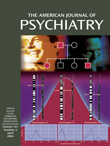Alendronic Acid for Antipsychotic-Related Osteopenia
Ms. A was a 58-year-old woman with paranoid schizophrenia. She had received trifluoperazine, 10 mg/day, for 2 years, followed by a depot injection of haloperidol decanoate, 125 mg every 2 weeks, for the past 12 years. After starting the haloperidol depot, she was amenorrheic for 18 months. Her periods were then regular until menopause, which occurred 7 years before she was seen. She was taking procyclidine, 5 mg/day, for mild extrapyramidal symptoms and had been stable since her only hospital admission 12 years ago.Our medication review service gave Ms. A a systematic evaluation of symptoms, side effects, and physical health. The assessment showed a mildly elevated prolactin level (505 mIU/ml, upper limit of normal=450 mIU/liter). Her gonadal hormone levels were consistent with her postmenopausal status (estradiol, 44 pmol/liter; follicle-stimulating hormone, 54 IU/liter; luteinizing hormone, 30.9 IU/liter; progesterone, 1.08 nmol/liter).In view of her hyperprolactinemia, Ms. A’s bone mineral density was evaluated with a dual X-ray absorptiometry scan of her lumbar spine and hip. Her spine and hip t scores were –2.02 and –1.74, respectively, both indicating osteopenia and an increased risk of fracture (3). Her age-corrected scores were low, at –0.67 (spine) and –0.84 (hip), compared to normal values of 0. She was uniparous and had never smoked or breast-fed. Her diet typically included 500 mg/day of calcium. She performed 140 minutes of weight-bearing exercise per week. There was no personal or maternal history of bone fracture or medical conditions.Ms. A did not wish to change antipsychotic treatment, citing its convenience. She began taking alendronic acid, 5 mg/day, to treat her osteopenia. A dual X-ray absorptiometry scan at 1 year showed that her spine and hip t scores had improved by 7% and 9% to –1.87 and –1.58, respectively. Her prolactin level remained mildly elevated.
References
Information & Authors
Information
Published In
History
Authors
Metrics & Citations
Metrics
Citations
Export Citations
If you have the appropriate software installed, you can download article citation data to the citation manager of your choice. Simply select your manager software from the list below and click Download.
For more information or tips please see 'Downloading to a citation manager' in the Help menu.
View Options
View options
PDF/EPUB
View PDF/EPUBGet Access
Login options
Already a subscriber? Access your subscription through your login credentials or your institution for full access to this article.
Personal login Institutional Login Open Athens loginNot a subscriber?
PsychiatryOnline subscription options offer access to the DSM-5-TR® library, books, journals, CME, and patient resources. This all-in-one virtual library provides psychiatrists and mental health professionals with key resources for diagnosis, treatment, research, and professional development.
Need more help? PsychiatryOnline Customer Service may be reached by emailing [email protected] or by calling 800-368-5777 (in the U.S.) or 703-907-7322 (outside the U.S.).

